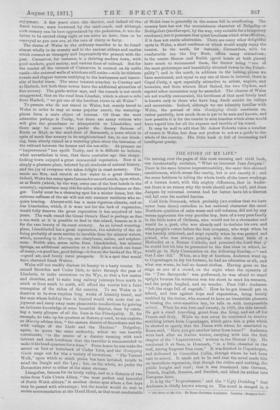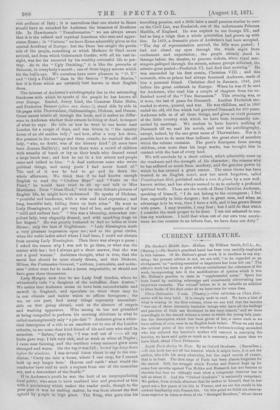THE STORY OF MY LIFE.* ON turning over the pages
of this most amusing and vivid book, one involuntarily exclaims, "What an innocent Jean Jacques I" There is the same intense impressionability, the same thin-skinned sensitiveness, which seems like vanity, but is not exactly it ; and the same boldness in telling the whole truth of the inner workings of a human heart, with this mighty difference, that in Ander- sen there is no reason why the truth should not be told, and Jean Jacques by universal consent had far better have let a discreet veil fall over his morbid fancies.
Cold little Denmark, which probably (we confess that we have
never been there) embodies in her national character the usual Northern qualities of calm sense and self-reliance, did not by any means appreciate the very peculiar boy, born of a very poor family in the little town of Ordeuae, who would not be a shoemaker and would be a poet, who was already said to declaim his own and other people's verses before the best company, who wept when he was harshly criticized, and wept equally when he was praised and petted, who was always praying with the direct faith of a Methodist or a R011.1111:1 Catholic, and promised the Lord that if he would but let him be promoted to the first class in school, he would go to Holy Communion on the following Sunday,—" and that I also did." When, as a boy of fourteen, Andersen went up to Copenhagen to try his fortune, he had no education at all, and what was worse, he had no decent clothes. Having gone on the stage as one of a crowd, on the night when the operetta of the "Two Savoyards " was performed, he was afraid to stand upright because his waistcoat was too short to meet his trousers, and the people laughed, and no wonder. Poor littl t Andersen "left the stage full of anguish." How he he got himself put to school, and rose against hope and expectation, being hourly snubbed by the rector, who seemed to have an irresistible pleasure in teasing the over-sensitive boy, he tells us with inexpressible naivete'. When he was four-and-twenty, in 1833, the tide turned. He got a small travelling grant from the King, and set off for France and Italy. While he was away he continued to receive snubbing letters from Copenhagen, which gave him a pain which he showed so openly that the Danes with whom he associated in Rome said, " Have you got another letter from home?" Andersen went back after an Italian winter, carrying with him the first chapter of the " Improvisatore," written in the Eternal City. He continued it at Saco, in Denmark, "in a little chamber in the roof, among fragrant lime trees." It was finished in Copenhagen, and dedicated to Councillor Collin, through whom he had been sent to school. It needs not to be said that the novel made hitu an immediate reputation, that though the critics said nothing, the public bought and read ; that it was translated into German, French, English, Russian, and Swedish, and lifted its author into Improvisatore" and the " Ugly Duckling" that
E fame.
I . European a b ny f t
Andersen is chiefly known among us. The novel is steeped in a
* Time story of Alit Life. By Haus Christian Andersen. Loudon : Sampon Low.
rich perfume of Italy ; it is marvellous that one winter in Rome should have so unlocked for Andersen the treasures of Southern life. In Hawthorne's "Transformation" we are always aware that it is the refined and mystical American who sees and appre- ciates Rome ; in " Corinne " we have Rome admirably given as the central Academy of Europe ; but the Dane has caught the poetic side of the people, something at which Madame de Steel never arrived, and from which Geheimrath Goethe, with all his vast in- sight, was too far removed by his wealthy successful life to por- tray. As to the " Ugly Duckling," it is like the proverbs of Solomon, in everybody's mouth ; one of those happy arrows which hit the bull's-eye. We ourselves have more pleasure in " 0. T." and " Only a Fiddler" than in the famous " Wonder Stories," but it is these which are certainly best known in their English dress.
The interest of Andersen's autobiography lies in the astounding frankness with which he speaks of the people he has known all over Europe. Rachel, Jenny Lind, the Countess Hahn Hahn, and Frederica Bremer (place au x dames l), stand side by side in his pages with Thorwaldsen, Oehlenschlager, Dickens, and Dumas. Great names bristle all through the book, and it makes no differ- ence to Andersen whether their owners be living or dead, in respect of what he says. He tells us how he went to one house near London for a couple of days, and was driven to "the country house of an old maiden lady ;" And how, after A very hot drive, five persons in the carriage and three outside, he reached the old lady, "who, no doubt, was of the literary kind" (it must have been Joanna Baillie's) ; and how there were a crowd of children with wreaths of beech or ivy on their heads who danced round a large beech tree ; and how he sat in a hot arbour and people came and talked to him. "A deaf authoress came who wrote political things, and many poets I had never heard of." The cud of it was he had to go and lie down the whole afternoon. We think that if he had known enough English to read the " Crofton Boys" and "Feats on the Fiord," be would have tried to sit up- and talk to Miss Martineau. Even "Dean Hook," with its calm delicate pictures of English life, he might have understood. He speaks of Dickens, "youthful and handsome, with a wise and kind expression ; and long, beautiful hair, falling down on both sides." He went to Lady Blessington's, and got very fond of her, and speaks of her "mild and radiant face." "She was a blooming, somewhat cor- pulent lady, very elegantly dressed, and with sparkling rings on her fingers." He was greatly bothered to find no ladies at Gore House; only the beat of Englishmen. 6' Lady Blessington made a very pleasant impression upon me ; and in the great circles, when the noble ladies asked where I had been, I could not abstain from naming Lady Blessington. Then there was always a pause ; I asked the reason why I was not to go there, or what was the matter with her ; but I always got a short answer, that she was not a good woman." Andersen thought, what is true, that the moral line should be more clearly drawn, and that Dickens, Milnes, the Postmaster-General, "authors, journalists, and noble, men" either went far to make a house respectable, or should not have gone there themselves.
Lady Morgan took him to see Lady Duff Gordon, whom he whimsically calls "a daughter of the authetess, Jane Austen." We notice that Andersen seems to have been uncomfortable and unwell in England, and speculate on what there may be in our climate and habits which so afflicts foreigners ; for we, on our part, find many things supremely uncomfort- able on first going abroad, such as the absence of carpets and washing apparatus. Who among us has not grumbled at being compelled to perform his morning ablutions in what he called contemptuously only "a pie-dish "? Andersen gives a whim- sical description of a ride in an omnibus out to one of the London suburbs, to see some dear kind friend of his and ours who shall be nameless. "Before," says he, "I was well out of — all my limbs gave way, I felt very sick, and as weak as when at Naples ; I came near fainting, and the omnibus every moment grew more thronged and warm. On the top it was full ; booted legs hung down before the windows. I was several times about to say to the con- ductor, Carry me into a house, where I can stop, for I cannot hold up any longer here.' Heaven and earth ! what would the conductor have said to such a request from one of the masculine sex, and a descendant of the Scalds ?"
if in Andersen's youth he was the butt of an unsympathizing local public, who seem to have snubbed him and preached at him 'with a perdistency which makes the reader smile, though to the poor poet it was no smiling matter, he was from almost the first upheld by p.mple in high place. The King, who gave him his
travelling pension, and a little later a small pension similar to ours on the Civil List, was Frederick, son of the unfortunate Princess Matilda, of England. He was nephew to our George III., and had so long a reign that a whole generation had grown up with him. In 1839, a dramatic piece of Andersen's had been accepted. "The day of representation arrived, the bills were posted; I had not closed my eyes through the whole night from excitement and expectation ; the people already stood in throngs before the theatre, to procure tickets, when royal mes- sengers galloped through the streets, solemn groups collected, the minute-guns pealed—Frederick VI. had died that morning." He was succeeded by his first cousin, Christian VIII. ; and this monarch, who as prince had always favoured Andersen, made of him a personal friend. Christian died in January, 1848, just before the great outbreak in Europe. When he was ill fie sent for Andersen, who read him a couple of chapters from his un- finished novel of the "Two Baronesses." This evening was, as it were, the last of peace for Denmark. Another Frederick suc- ceeded to storm, quarrel, and war. He was childless, and in 1863 ended the old, old line which had governed Denmark for 400 years. Andersen tells us of all these things, and gives us vivid pictures of the little country with which we have been incessantly con- nected by marriage. We confess to have known nothing of Denmark till we read his novels, and now his autobiography, except, indeed, by the one great name of Thorwaldsen. Nor is it. possible here to do more than indicate the great store of anecdote which the volume contains. The poet's European fame among children, even more than his large works, has brought him in contact with the best of every land.
We will conclude by a short extract, which admirably sums up the weakness and the strength of his character ; the reasons why he has suffered so much from mockery, and the genuine power by which he has created a great career. The same theme has been treated in an English novel, now too much forgotten, called Framlingham halt, published under a nom de plume by a now well- known writer, and has always seemed to us to embody a profound spiritual truth. These are the words of Hans Christian Andersen, speaking of himself, "I do not belong to the courageous ; I feel fear, especially in little dangers ; but in great ones, and when an advantage is to be won, then I have a will, and it has grown firmer with years. I may tremble, I may fear ; but I still do that which I consider the most proper to be done. I am not ashamed to con- fess my weakness. I hold that when out of our own true convic- tions we run counter to an inborn fear, we have done our duty."































 Previous page
Previous page